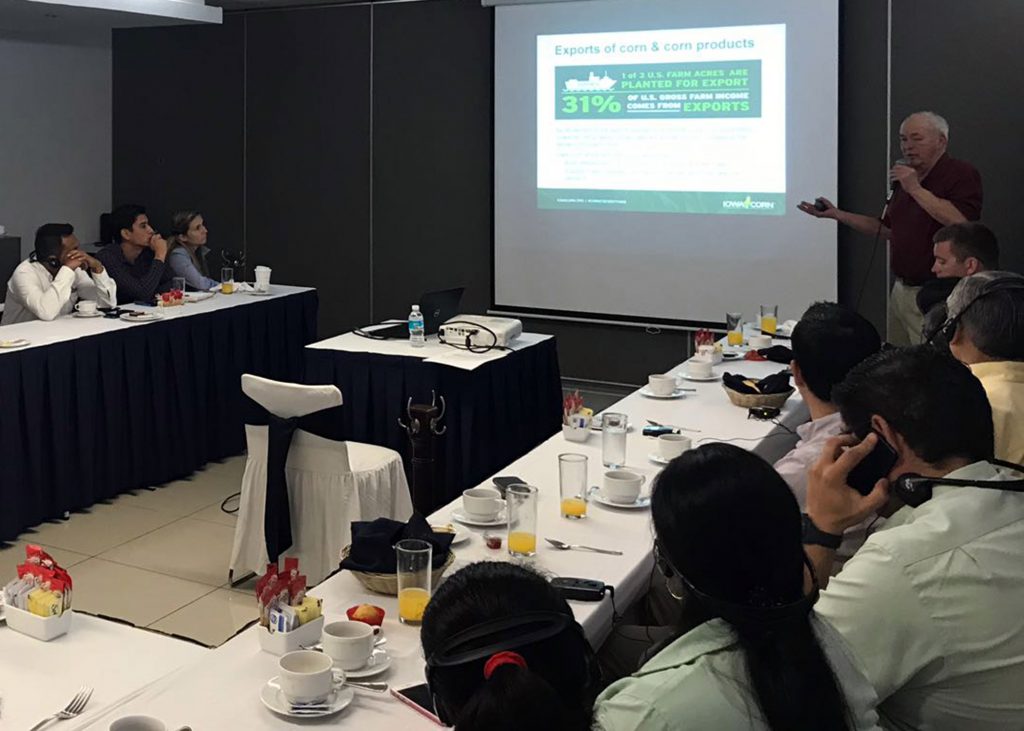Two farmers from Iowa – Dick Gallagher and Brandon Struzenberg – recently joined the U.S. Grains Council (USGC) in Mexico for the first rollout event of the 2017/2018 Corn Export Cargo Quality Report. The pair fielded questions on quality at the farm level and provided their own perspectives on farming practices and trade policy concerns.
“I believe it is very important – it is a two-way street,” Gallagher said in an audio interview following his return to the United States. “They get to listen to some of our production practices and we get to listen to some of their concerns.”
Alejandra Danielson Castillo, USGC manager of global trade, also participated in the rollout event and echoed the importance of adding farmer voices to the conversation on quality.
“One of the greatest things the Council does is tell these stories of the humanness of farming,” Danielson Castillo said. “Every single time we bring a farmer to talk about the work that they do, you not only hear how proud they are, but also that they are so passionate about seed technology, soil health, conservation practices – and you start to see a different side of the story.”
At the first rollout seminar in Merida, Mexico, customers voiced some concerns with fluctuations in vomitoxin, but were generally pleased with the report.
“For the most part, they were very pleased because the quality is good,” Gallagher said. “Everything is at No. 2 quality and the aflatoxin and mycotoxin levels were below what was acceptable.”
The second day of presentations took place at ANFACA, one of the largest grain and feed associations in Mexico responsible for roughly 25 percent of Mexican grain imports. The association hosts weekly breakfasts at its offices and the Council was invited to provide information from the quality report in addition to discussing the farmers’ own practices. The group of end-users and agribusinesses also expressed concerns with the renegotiations of the North American Free Trade Agreement (NAFTA) and the future of the long-standing partnerships built between U.S. and Mexican agricultural industries. Both farmers emphasized the importance of markets to their farming operations and reiterated the farming industry’s support of the trade agreement.
“People’s minds were really on relationship-building and how to ensure those relationships stay in place,” Danielson Castillo said. “They were appreciative of the report and felt confident that the quality information we were giving them was accurate – and so they felt at ease to voice the other concerns that they have.”
The Council’s series of activities ended with a visit to a large feed conglomerate’s industrial park southwest of Guadalajara. There, both farmers were able to witness firsthand where their corn is delivered at the fully integrated poultry, dairy and swine producer complete with its own state-of-the-art swine processing facility and even its own rail port. For Gallagher, seeing the technology and investments of Mexican industry in person only further emphasized the importance of maintaining key relationships with customers like this one.
“As farmers, we are not the only supplier of corn in the world,” Gallagher said. “We have competition and it is important for us to listen to what our importers and end-users want. And we need to do the best possible job that we can to keep these people satisfied if we want to keep these markets.”
The Council will continue to roll out the report’s results and address customer concerns during crop quality seminars in other countries. These outreach activities help establish clear expectations with buyers and end-users regarding the quality of corn this marketing year. Additionally, they provide information on U.S. farming practices, grading, handling and how U.S. corn is moved and controlled through export channels.
Read the full report here.
About The U.S. Grains Council
The U.S. Grains Council develops export markets for U.S. barley, corn, sorghum and related products including distiller’s dried grains with solubles (DDGS) and ethanol. With full-time presence in 28 locations, the Council operates programs in more than 50 countries and the European Union. The Council believes exports are vital to global economic development and to U.S. agriculture’s profitability. Detailed information about the Council and its programs is online at www.grains.org.

